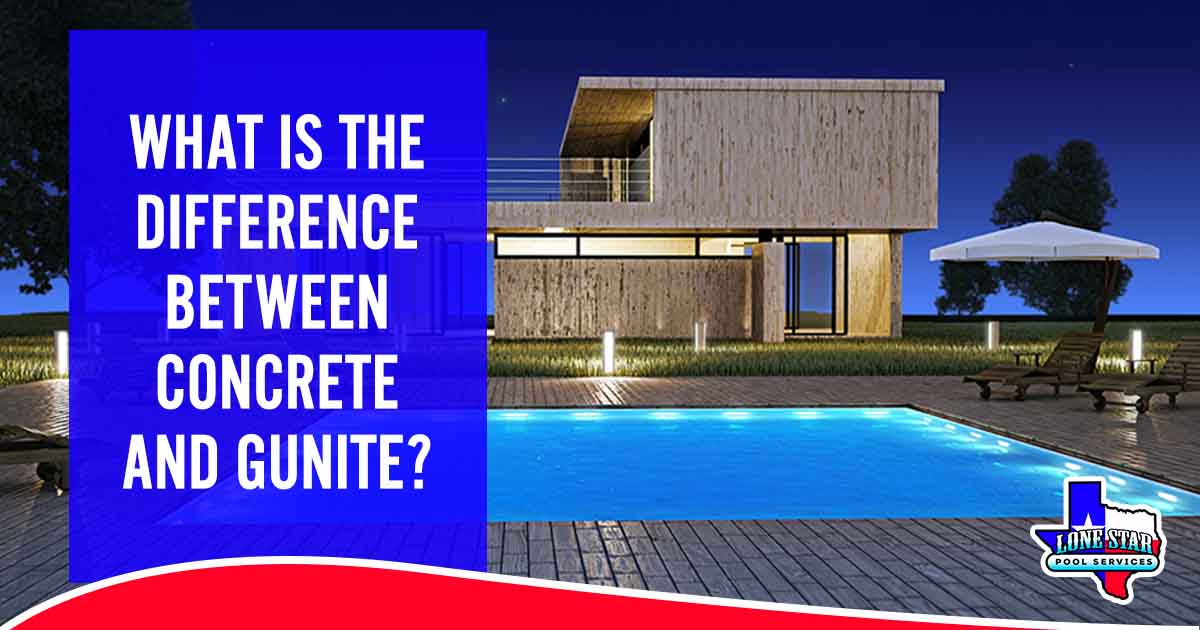When it comes to installing an in-ground pool, there are many factors to consider. Besides location and cost, there are several fine details to think about before making the commitment, one of them dealing with the material you choose for your pool. For example, you may wonder: what is the difference between concrete and gunite? Concrete and guniteare the two most popular pool construction materials. Gunite is actually a form of concrete. The difference between the two is in how it is applied.
At Lone Star Pool Services, we can help you determine which is best for your situation. Let’s take a look at the two as well as the pros and cons of choosing each one to help you make your decision.
What is Concrete?
Before we can even start talking about deciding between concrete and gunite and which is best for your in-ground pool, we need to understand what each one is and how it is made.
Concrete is pretty versatile in that it can be used for pools as well as to form walls and columns. It is made from mixing water, cement, sand, and usually either stone or gravel. Concrete usually contains fine and large aggregate particles.
When it comes to pools, you either choose to use a dry-mix process or a wet-mix process. This wet-mix process is often referred to as “shotcrete”. That’s when everything is mixed and is usually delivered to your home in one of those cement trucks you’re probably familiar with.
When you use a dry-mix process, that’s when gunite comes into play. We’ll go into the details of gunite later, but basically gunite is water-free until the person installing your pool actually applies adds it in. It is still basically concrete.
Advantages of Using Concrete for your In-ground Pool
Using regular concrete for your in-ground pool has its advantages. They include:
- Concrete is pre-mixed, so there are no real concerns about finding the right ratio of materials
- It forms a strong coating
- Concrete takes less time to install
- Long-lasting
- Good for all climates
Disadvantages of Using Concrete for Your In-ground Pool
While using concrete for your in-ground pool has several advantages, there are also some disadvantages to consider.
- Labor intensive to install
- Concrete (Shotcrete) more expensive than gunite
- Cracks can form if too much water is added to the mix
- If water is added in the truck to keep it from hardening, it could affect the strength of the concrete
- Must stay on top of filter cleaning process because metals and alkaloids can leech into the water through the plastic filter
What is Gunite?
You could refer to gunite as concrete’s cousin because they are both in the same family, but have their differences. Gunite is the dry mixed form of sprayed concrete. Gunite typically only contains fine particles in its mix while concrete contains both large and small particles.
For gunite, builders load a pre-mixed dry material into the delivery equipment. Compressed air is then sent through a nozzle where it mixes with water. When it’s mixed it sprays out in a super strength which helps to compact the material.
Gunite pools use a rebar framework that is sprayed over with a concrete and sand mixture rather than being poured like regular cement. This makes gunite highly durable and flexible in that it can be made into many different shapes when it comes to in-ground pools.
Advantages of Using Gunite for Your In-ground Pool
Gunite is becoming a popular choice when it comes to building in-ground pools for many reasons. Here are a few:
- Gunite pools are built and designed on site providing the owner with endless possibilities
- Gunite pools can also have tile, fiberglass, or many plastic finishes
- Less expensive than regular concrete
- Workers can stop and start as needed since they are mixing the gunite on-site
- Often referred to as the sturdiest of pool materials
Disadvantages of Using Gunite for Your In-ground Pool
When deciding whether concrete or gunite is best for your in-ground pool, consider these disadvantages:
- Gunite application requires a highly skilled team; one wrong move in the sand/cement/water ratio area and your pool could be sunk…literally
- Dry mixture is known to clog house pipes
- Extremely time-consuming because all mixing and shaping is done onsite
- Bottom of pool can be abrasive and uncomfortable
- Pools have a porous surface which makes them more prone to algae growth
Final considerations when Deciding Between Concrete and Gunite
Now that you understand the basics of concrete and gunite pools, there are some final factors to take into consideration. Ask yourself the following questions as you make your decision:
- How much of an investment do I want to make?
- Do I want to have total control of the customization capabilities of the pool?
- How many bells and whistles do I want to add to the pool?
- Do I want to wait the allotted time to construct a concrete or gunite pool?
- If deciding on a concrete pool, do I want to pay for resurfacing that usually takes place every 10 years and can be costly?
We know having a pool should be something fun, be before you can start splashing and relaxing, you need to keep these things in mind to make sure you are making the right investment for your needs. Your pool needs to complement your property and fit in well with the landscaping as well.
If you are looking for ideas, contact Lone Star Pool Services for inspiration. We have helped countless customers make the right choice when it comes to their pools and can do the same for you.

